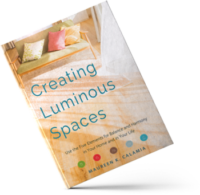 In feng shui, we know that our homes and work spaces affect our lives. We understand that our spaces are a reflection of our bodies and our minds. We understand that poor feng shui in our spaces can lead, very rapidly, to poor energy in our lives: a cluttered, unkempt home can lead to stagnation in several, if not all areas, of our lives; an overly yang work environment can lead to confusion, distraction and, eventually illness.
In feng shui, we know that our homes and work spaces affect our lives. We understand that our spaces are a reflection of our bodies and our minds. We understand that poor feng shui in our spaces can lead, very rapidly, to poor energy in our lives: a cluttered, unkempt home can lead to stagnation in several, if not all areas, of our lives; an overly yang work environment can lead to confusion, distraction and, eventually illness.
We can point to a front door aligned with the back door and state that the chi is unable to be sustained and gather for any length of time, which will create struggle in their lives. We can explain that all the large, open windows can make our client feel vulnerable and unsupported. Or that a bedroom with red walls will be too energetic and can be a major reason why they aren’t able to sleep. This is all sound intuitive understanding. However, for many of us, our rational side craves evidence to support these statements.
When I uncovered the study of environmental psychology I was thrilled that there was some logic behind what we do (what can I say? I’m a woman of logic!)
Environmental psychology is a branch of psychology that examines the interrelationship between environments and human behavior. It looks at how the environment impacts the experience of our senses. It’s research is also known as “evidence-based design.”
“Other than architects [and feng shui consultants], few people think about architecture, but many feel it. It is those who don’t that I feel sad for, for their aesthetic feelings have been blunted, even obliterated – and architecture must carry much of the blame.” – Chris Day (Places of the Soul, 2002, page 3).
Evidence-based design provides some valuable insights on concepts that support good feng shui environments:
- Research has proven the significance of nature views from hospital windows. “A study on hospitals found improved environment reduced treatment times by 21 percent and class A analgesic use by 59 per cent – major cost savings! Roger Ulrich, whose 1984 studies correlating patient view and recovery time pioneered this field, considers every tree leaf visible from a hospital window ‘worth its weight in gold’.” (Places of the Soul, p.2).
- The idea that the flow of chi provides life force energy – “In nature, there is often a sense of smooth movement (breezes, flow of a brook, the sunlight shifting, etc.) that may be missing in man made environments” – Sally Augustin, PhD (Place Advantage: Applied Psychology for Interior Architecture, 2009, p. 85).
- The importance of sitting and sleeping in command position – “People feel secure when there are solid walls behind them or other things that would block an imagined evil-doer, such as a column, tall bushy plant, high and sturdy chair back, substantial piece of sculpture, etc.” (Robson, 2008).
- High ceilings disperse the chi and create too formal of an atmosphere for real connection with others – “The ‘cavernous’ ceiling heights of McMansions…are so high that they make these spaces seem too formal, which is at odds with the intimate family gatherings that many hope for in these settings.” (Place Advantage: Applied Psychology for Interior Architecture, p. 170).
These are just a few of the studies that prove aspects of the effects of good or poor feng shui! Not everything can be proven or explained, nor should they be. But it is feeds the scientist in my soul to have some hard facts every once in a while!
Image credit: kaboompics.com



Reader Interactions